
views
- Drink some water. Sometimes stomach gurgling is a sign you're thirsty.
- Try not to eat too much right before class, since that can cause an upset stomach.
- Limit the amount of indigestible foods you eat, like potatoes, pears, and broccoli.
- Take a short walk after you eat to aid in digestion and stop your stomach from growling.
Adjusting Your Diet

Drink water. Sometimes when your stomach gurgles, you’re not actually hungry—you’re thirsty. Keep a water bottle nearby and take sips whenever you feel the need. That way, your stomach won’t growl as a reminder to stay hydrated. Try not to chug water, especially right before class. While drinking small amounts of water throughout the day is good, chugging a lot of water all at once can make your stomach gurgle even louder.
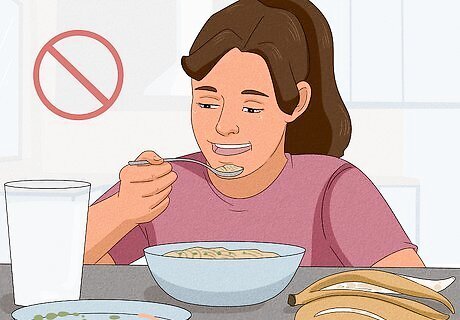
Try not to eat large meals before class. When you eat too much food, it will put your digestive system into overdrive. The growling can occur more often when this happens, because there is more food to move through the intestines. If you do eat too much and need to recover from it, try taking a short walk or drinking herbal tea.

Avoid going to class on an empty stomach. When your stomach has been empty for 2 hours, the growling sounds louder. This is because there is little or nothing in the stomach to absorb or muffle the noise. When you go hours without eating, your body releases hormones that let the brain know it’s time to clear anything left in the stomach to make room for whatever food is to come. Have small, healthy snacks with you at all times.

Limit indigestible foods. Certain carbs are resistant to digestion. Don’t avoid carbs completely, since they help supply you with energy. Simply eat them in moderation to keep your stomach healthy but less likely to growl. Resistant starch: potatoes or pasta that has been cooled after cooking, sourdough bread, and unripe fruit. Insoluble fiber: whole-wheat flour, wheat bran, cabbage, lettuce, and bell peppers. Sugar: apples, pears, and broccoli.

Pay attention to your hunger cues. Remember that growling can happen both when you’ve just eaten and when you haven’t eaten in a while. Figure out when the best meal time for you is, and be sure to keep snacks on-hand just in case. Most people need 3 full meals and 2 to 3 snacks per day.

Eat slowly and chew properly. People who swallow a lot of air usually experience more stomach growling than others. If you eat too fast or talk a lot while eating, you are likely swallowing a lot of air. Eat more slowly to avoid this.
Avoiding Gas

Take gas relief medicines. Excessive gas in the gut can cause loud stomach growling. A simple way to reduce bloating and gas is by taking an over-the-counter gas relief medication. Try to take it before you eat food that causes you to be overly gassy. Look for brands like Gas-X or Gas Minis.
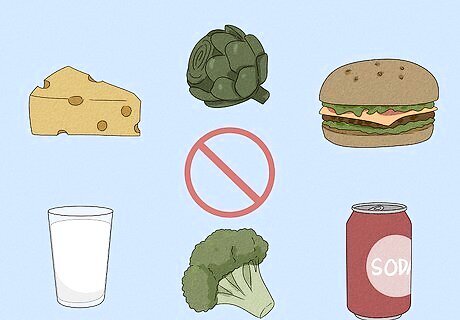
Avoid dairy and high-fiber foods before class. Certain foods are known to cause gas because of the complexity in breaking them down. Avoiding an excess of these foods will help control your stomach growling. Limit foods like: Cheese Milk Artichokes Pears Broccoli Beans Fast food Soda

Take a walk after you eat. It doesn’t have to be more than a ½ a mile. Walking will aid in digestion and keep your bowels moving along in a healthy manner. Plus, walking for just 10 minutes after a meal has been proven to lower your blood pressure, along with other health benefits.
Addressing Disorders and Intolerances

Exercise consistently. A sedentary lifestyle can lead to stomach problems, which can cause loud gurgling. Not exercising will create a negative impact on your weight and physical tolerance to certain foods which will lead to a bloated stomach, gas, and extremely loud noises. Try to get around 150 minutes of exercise per week to stay healthy and fit.

Treat any anxiety or nervousness you may experience. If you are constantly nervous or anxious, your nerves send signals to your stomach. These signals cause gurgling sounds. If you notice that you experience stomach gurgling throughout the day, regardless of diet or lifestyle changes, you may have a nervous disorder that can be addressed by a doctor. Visit a mental health professional to talk about your symptoms of anxiety and how best to treat them.
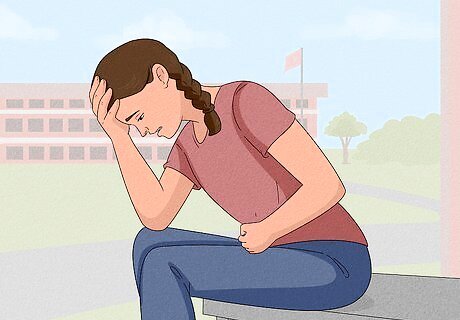
Learn food intolerance symptoms. Consuming certain food items can cause allergic reactions that cause an upset stomach and force stomach gurgling. If you notice stomach discomfort often after eating the same kinds of food—avoid that food. The most common kind of food intolerance is lactose intolerance. This is when dairy products cause intense stomach irritation. To test for lactose intolerance, see how you feel after eating foods with lactose in them, like milk, cheese, and butter. If you have symptoms like an upset stomach, nausea, or diarrhea, it’s likely that you’re lactose intolerant.Did You Know? Some people suffer severe reactions when they eat wheat, barley, and rye derivatives due to gluten, known as celiac disease.
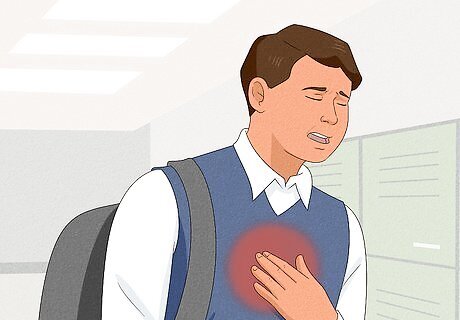
Notice severe indigestion, also known as dyspepsia. Upper abdominal pain, excessive belching, nausea, feeling full after a small amount of food and swelling of the abdominals are all symptoms of a more serious indigestion problem. If you experience these consistently, seek medical attention. Dyspepsia is not a life-threatening problem but should be addressed. To get rid of indigestion and cure nausea, try drinking tea with ginger in it or getting some fresh air.
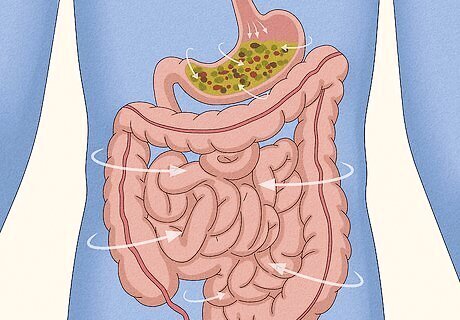
Understand why your stomach is growling. Your stomach growling is caused by your digestive system doing what it’s supposed to do: mixing food, fluids, and gastric juices and pushing them through the intestinal tract. The rumbling occurs when the walls of your gastrointestinal tract contracts and relaxes to squeeze everything through the intestines. Even with a proper diet, growling is bound to happen sometimes, and there’s no reason to be embarrassed.




















Comments
0 comment